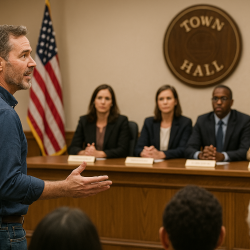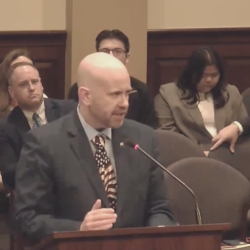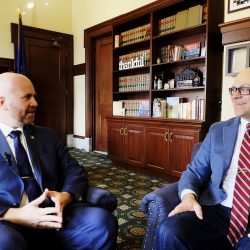On November 6, 2024, the Citizen’s Committee on Legislative Compensation voted to increase the base salary for members of the Legislature from $19,913 per year to $25,000. This set off a campaign by several conservative legislators and local organizations as well as an out-of-state lobby group encouraging the Legislature to reject the raise.
I’ve written extensively about the issue of legislator pay and the political tempest surrounding it — see here, here, here, here, and here — so I won’t rehash it all here. Go back and read each article in order to see how the situation has played out. The story reached its conclusion in the House Ways & Means Committee early this morning.
Last week, Sen. Christy Zito presented Senate Concurrent Resolution 101 in Senate State Affairs. The resolution would reject the pay increase, leaving the base salary at $19,913, though it would not have required legislators to pay back anything they had already received.
SCR 101 passed committee and then passed the Senate via voice vote. Young Americans for Liberty (YAL), the organization that had been flooding social media with ads demanding voters tell their legislators to support the resolution, was clearly hoping for a roll call vote it could use for further ads against dissenting legislators. Only Sen. Phil Hart debated in opposition to the resolution, laying out the same concerns he has regarding the balance of power within the government that I shared last fall.
Speaker Mike Moyle referred SCR 101 to the House Ways & Means Committee, which is a special committee made up of Republican and Democratic leaders that only meets as necessary. Rep. Kent Marmon presented the resolution this morning and faced questions from Rep. Jason Monks, the House Majority Leader, about whether it was a true rejection of the raise.
As noted above, the text of the resolution says that any pay already delivered to members of the Legislature prior to its adoption would still be counted as being at the rate set by the Citizen’s Committee. Monks argued that by leaving that alone, this resolution was not a full rejection, but a reduction of pay, contrary to Idaho law. He pointed to Idaho Code section 67-406b, passed in 1976, which unlike the text of the Idaho Constitution does not allow the Legislature to reduce the proposed pay, only reject it:
The rates thus established shall be the rates applicable for the two (2) year period specified unless prior to the twenty-fifth legislative day of the next regular biennial session, by concurrent resolution the senate and house of representatives shall reject said rates of compensation and expenses and declare the same to be inoperative.
I’m not a lawyer, so I can’t say whether or not Rep. Monks’ interpretation of the statute is correct. However, I suspect the sponsors of the resolution might have been aware of this interpretation of the law. On November 8, 2024, two days after the Citizen’s Committee enacted the raise, eight legislators aligned with YAL issued a press release that contained a draft resolution to reduce the raise to 2.5%. However, when Sen. Zito introduced the actual resolution last week, it did not contain that smaller raise, but rejected the recommendation altogether.
Monks went on to debate against the resolution, saying that the Legislature has fallen well behind other branches of government as well as state employees over the past fifteen years. A few weeks ago, I plotted the base legislative salary since 1991 accounting for inflation and discovered that this raise to $25,000, though stark, merely returns the Legislature to parity with its early 2000s base salary:
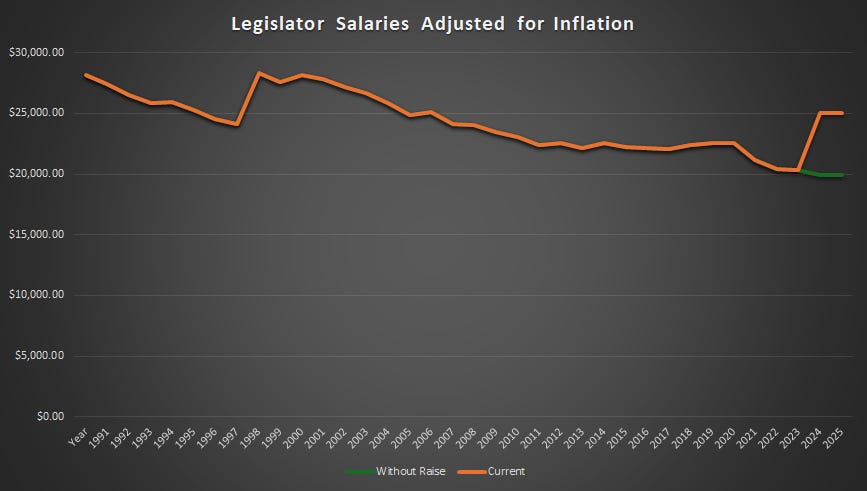
During his presentation, Rep. Marmon reminded the committee that the Idaho Republican Party passed a resolution against the pay raise, calling on the Legislature to cut taxes before taking additional salary. You can read the full text of the resolution here:
Rep. Monks pushed back on the demand that tax cuts precede a salary increase, claiming that the Legislature has returned $4.6 billion to the people of Idaho in the form of tax relief over the past six years. While some of that might involve creative accounting (Gov. Brad Little’s school infrastructure initiative last year was sold as tax relief despite simply moving money from one bucket to another), it’s true that the Legislature has significantly cut taxes in every recent session.
Rep. Monks moved to table the resolution. Rep. Ilana Rubel, the Democratic House Minority Leader, debated in favor of that motion, saying she would like to see salaries high enough to allow regular working people to run for office while still making a living and feeding their families. The motion passed 5-1, with only Rep. Jaron Crane, the House Majority Caucus Chair, voting against. Having been tabled, SCR 101 is effectively dead, and the pay raise is in effect for the next two years.
The eight YAL-aligned lawmakers released a video shortly after the hearing blasting Rep. Monks and Speaker Moyle for refusing to listen to what they believe to be the will of the people of Idaho. In the video, the lawmakers claimed the mantle of “the conscience of the Legislature” and promised to always fight for the people.
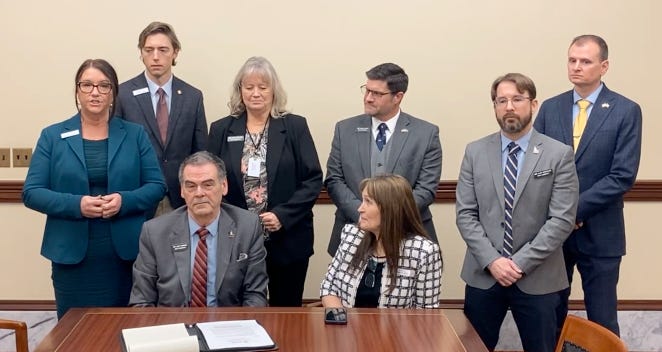
Rep. Monks had already introduced a competing resolution yesterday, creating a pathway for legislators to donate unwanted compensation to the tax relief fund. Fred Birnbaum of the Idaho Freedom Foundation (IFF) wrote an article saying that this resolution missed the mark. This resolution should reach the House floor as early as Thursday.
So, after more than two months of sound and fury, nothing has materially changed in the end. The recommendation of the Citizen’s Committee will remain in effect. The longest lasting effect of this discourse is the way in which the eight YAL-aligned legislators have drawn a line in the sand, claiming the mantle of Idaho’s only true conservatives. YAL itself has surely added to its email list and war chest, which will be coming to bear in the near future in the debate over grocery taxes.
Sen. Brian Lenney pointedly asked last week if this resolution against the pay increase actually helps Idahoans. He ultimately supported the resolution on the Senate floor, but decried what he believed was a waste of resources and political capital when there were many more important issues at hand. Is he correct? From a fiscal standpoint, the money being debated here was literally pennies according to some math by Mountain States Policy Center.
Conservative activists might suggest that the people of Idaho now see who are the “true conservatives” and who are the posers playing “access politics,” but I don’t believe it’s that simple. There are good arguments on both sides of the pay raise, and I’ve done my best to share them all over the past few months. Beware of those who claim that anyone who disagrees with them on this or that issue is not a true conservative, or even some sort of traitor.
Thomas Sowell famously said, “There are no solutions, only tradeoffs,” and this is particularly true for issues that are not clearly tied to an overriding moral principle. One side might argue that the key principle is saving taxpayer money, while the other can say it’s that workmen are worthy of their wages. Activist groups often present their preferred position as obviously and objectively correct, knocking down a few strawman arguments from the opposing side while largely ignoring more substantive counterarguments. The goal of these groups is not to inform you, but to outrage you. For example, YAL doesn’t want you to see their Facebook ads and then open several browser tabs to conduct your own research. Instead, they want you to feel angry enough to click, message your lawmaker, and, in the process, sign up for their mailing list.
People often talk about political courage; I believe that both Reps. Marmon and Monks exhibited courage this morning. Kent Marmon stood up in front of what he had to know was a committee that was hostile to his proposal and fearlessly presented his reasons for adopting the resolution. He endured a barrage of questions from Rep. Monks, knowing that the point of these questions was to establish a foundation for rejecting the resolution. I commend him for that.
Yet Jason Monks showed courage as well. He knew that rejecting this resolution would paint a massive target on his back for groups such as IFF and YAL, not to mention many outspoken conservative activists who are not shy about sharing their feelings online. As Majority Leader, he took it upon himself to endure those slings and arrows, sharing not only his position that the resolution not a good idea, but that the pay raise itself was not necessarily a bad one. I commend him as well.
Beneath the sound and fury, behind the political games, our system is ideally about presenting competing ideas, fully debating them, and adopting what the majority deems best. Obviously we live in a world of neverending political campaigns, and I’m sure YAL is already cutting ads against Rep. Monks for his 2026 primary race. Yet within the noise of politics is a process for crafting policy, and that should be our primary focus. There is a lot of work yet to be done before the 2025 session is over.
Gem State Chronicle is a reader-supported publication. To receive new posts and support my work, consider becoming a free or paid subscriber.
About Brian Almon
Brian Almon is the Editor of the Gem State Chronicle. He also serves as Chairman of the District 14 Republican Party and is a trustee of the Eagle Public Library Board. He lives with his wife and five children in Eagle.










